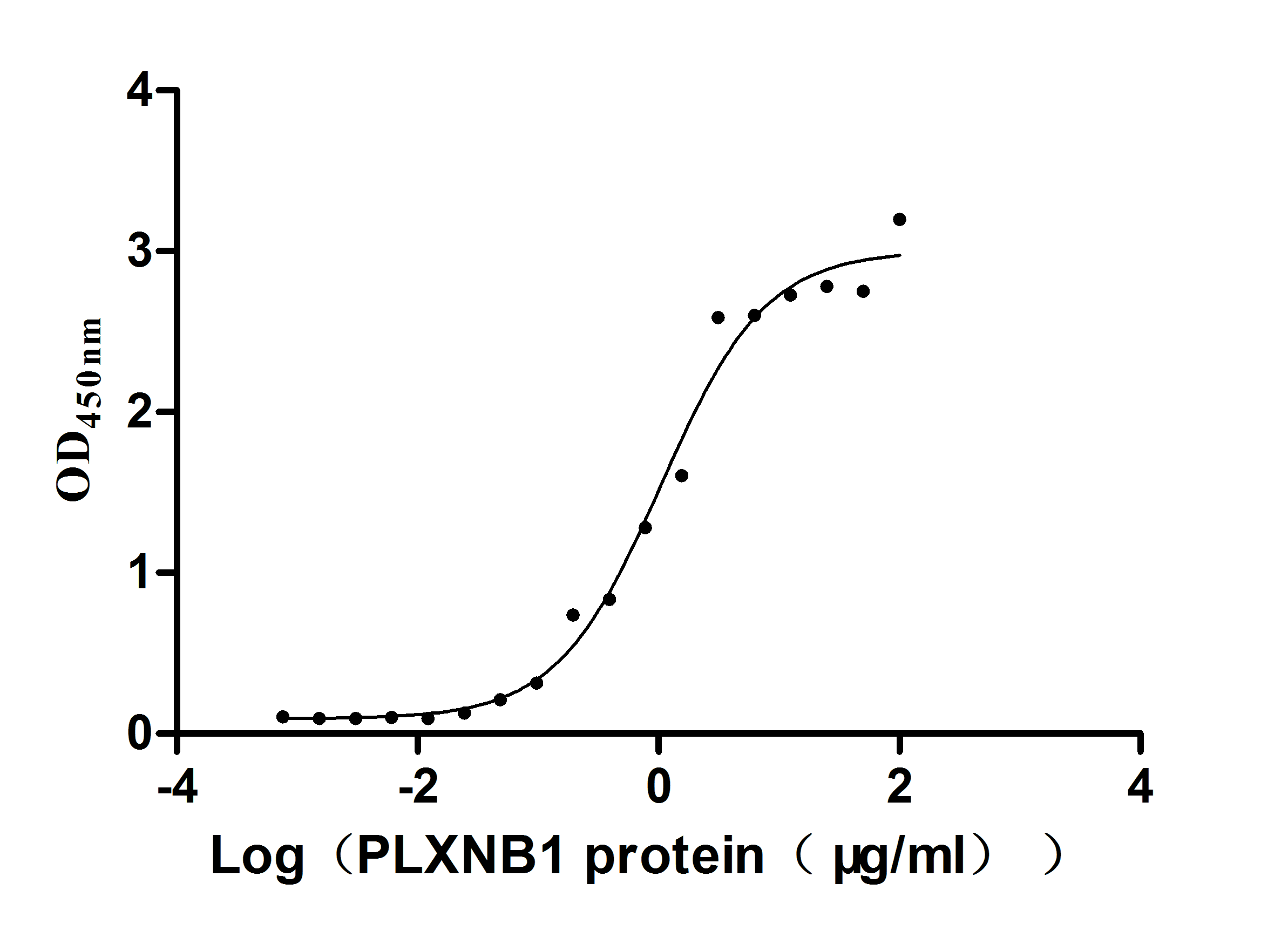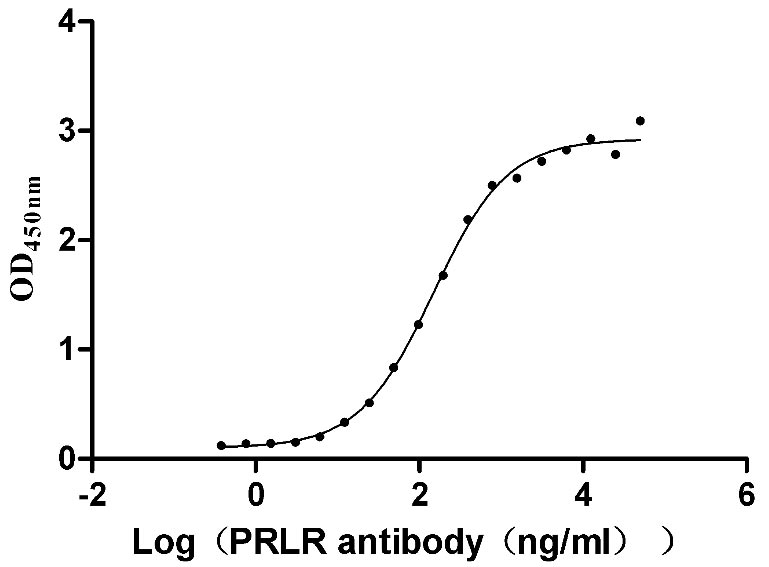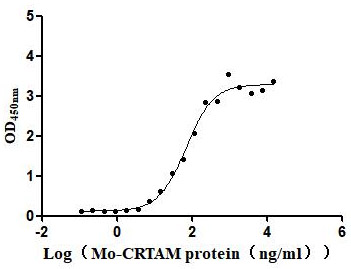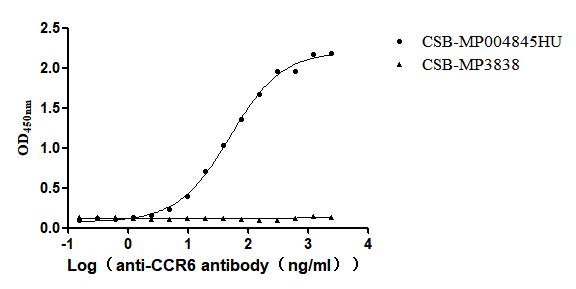Recombinant Mouse Oxidized low-density lipoprotein receptor 1 (Olr1), partial
-
货号:CSB-YP872111MO
-
规格:
-
来源:Yeast
-
其他:
-
货号:CSB-EP872111MO
-
规格:
-
来源:E.coli
-
其他:
-
货号:CSB-EP872111MO-B
-
规格:
-
来源:E.coli
-
共轭:Avi-tag Biotinylated
E. coli biotin ligase (BirA) is highly specific in covalently attaching biotin to the 15 amino acid AviTag peptide. This recombinant protein was biotinylated in vivo by AviTag-BirA technology, which method is BriA catalyzes amide linkage between the biotin and the specific lysine of the AviTag.
-
其他:
-
货号:CSB-BP872111MO
-
规格:
-
来源:Baculovirus
-
其他:
-
货号:CSB-MP872111MO
-
规格:
-
来源:Mammalian cell
-
其他:
产品详情
-
纯度:>85% (SDS-PAGE)
-
基因名:
-
Uniprot No.:
-
别名:Olr1; Lox1; Oxidized low-density lipoprotein receptor 1; Ox-LDL receptor 1; Lectin-like oxidized LDL receptor 1; LOX-1; Lectin-like oxLDL receptor 1; Lectin-type oxidized LDL receptor 1) [Cleaved into: Oxidized low-density lipoprotein receptor 1; soluble form]
-
种属:Mus musculus (Mouse)
-
蛋白长度:Partial
-
蛋白标签:Tag type will be determined during the manufacturing process.
The tag type will be determined during production process. If you have specified tag type, please tell us and we will develop the specified tag preferentially. -
产品提供形式:Lyophilized powder
Note: We will preferentially ship the format that we have in stock, however, if you have any special requirement for the format, please remark your requirement when placing the order, we will prepare according to your demand. -
复溶:We recommend that this vial be briefly centrifuged prior to opening to bring the contents to the bottom. Please reconstitute protein in deionized sterile water to a concentration of 0.1-1.0 mg/mL.We recommend to add 5-50% of glycerol (final concentration) and aliquot for long-term storage at -20℃/-80℃. Our default final concentration of glycerol is 50%. Customers could use it as reference.
-
储存条件:Store at -20°C/-80°C upon receipt, aliquoting is necessary for mutiple use. Avoid repeated freeze-thaw cycles.
-
保质期:The shelf life is related to many factors, storage state, buffer ingredients, storage temperature and the stability of the protein itself.
Generally, the shelf life of liquid form is 6 months at -20°C/-80°C. The shelf life of lyophilized form is 12 months at -20°C/-80°C. -
货期:Delivery time may differ from different purchasing way or location, please kindly consult your local distributors for specific delivery time.Note: All of our proteins are default shipped with normal blue ice packs, if you request to ship with dry ice, please communicate with us in advance and extra fees will be charged.
-
注意事项:Repeated freezing and thawing is not recommended. Store working aliquots at 4°C for up to one week.
-
Datasheet :Please contact us to get it.
相关产品
靶点详情
-
功能:Receptor that mediates the recognition, internalization and degradation of oxidatively modified low density lipoprotein (oxLDL) by vascular endothelial cells. OxLDL is a marker of atherosclerosis that induces vascular endothelial cell activation and dysfunction, resulting in pro-inflammatory responses, pro-oxidative conditions and apoptosis. Its association with oxLDL induces the activation of NF-kappa-B through an increased production of intracellular reactive oxygen and a variety of pro-atherogenic cellular responses including a reduction of nitric oxide (NO) release, monocyte adhesion and apoptosis. In addition to binding oxLDL, it acts as a receptor for the HSP70 protein involved in antigen cross-presentation to naive T-cells in dendritic cells, thereby participating in cell-mediated antigen cross-presentation. Also involved in inflammatory process, by acting as a leukocyte-adhesion molecule at the vascular interface in endotoxin-induced inflammation. Also acts as a receptor for advanced glycation end (AGE) products, activated platelets, monocytes, apoptotic cells and both Gram-negative and Gram-positive bacteria.
-
基因功能参考文献:
- The analysis also revealed that OLR1 is not required for the transcriptional regulation induced by oxidized PAPC but interestingly, OLR1 knockdown affected expression of CNN2, HMRR, ITGB6 and KIF20A, all genes governing cell proliferation and motility. PMID: 29103984
- Reduced expression of miR-98 may relate to LOX-1 expression and foam cell formation and lipid accumulation in aortas of ApoE(-/-) mice. PMID: 29549823
- hyperoside inhibits oxLDL-induced LOX-1 expression, ERK activation, and cell proliferation through the oxLDL-LOX-1-ERK pathway in VSMCs. PMID: 28434118
- data revealed that miR-let-7g exhibits anti-atherosclerotic activity, at least partially by targeting the LOX-1 signaling pathway. PMID: 28535009
- Adiponectin, TNF-alpha, and LOX-1 exert complex regulatory effects on the coronary microvascular endothelial function in atherosclerotic ApoE knockout mice. PMID: 27050429
- LOX-1 in cardiomyocytes plays an important role in the pathology of doxorubicin-induced cardiomyopathy. LOX-1 deletion altered the LOX-1-related signaling pathway, which led to improvements in cardiac function, myocardial inflammation, fibrosis and degenerative changes after DOX treatment. PMID: 27195769
- Enzymatically modified low-density lipoprotein promotes foam cell formation in smooth muscle cells via macropinocytosis and enhances receptor-mediated uptake of oxidized low-density lipoprotein. PMID: 27079883
- Therefore we concluded that HNG could inhibit ox-LDL-induced macrophage-derived foam cell formation, which occurs because of a decrease in lipid uptake and an increase in cholesterol efflux from macrophage cells. PMID: 27815075
- The study indicated that the LOX-1/ox-LDL system in chondrocytes plays a role in the pathogenesis of age-related knee knee osteoarthritis, which is potentially a target for preventing knee osteoarthritis progression. PMID: 28348422
- We demonstrated that varenicline upregulates expression of LOX-1 and CD36 significantly through alpha7 nAChR, thereby promoting oxLDL uptake in macrophages. PMID: 28202387
- this study shows that LOX-1 can regulate inflammation through regulation of generation of reactive oxygen species in in Aspergillus fumigatus keratitis PMID: 27694040
- The in vitro and in vivo models revealed that lipid metabolism disorder and FK506 caused oxidative stress and a fibrogenic response. In addition, decreased levels of LOX1 markedly reduced the levels of TGFb1 in the in vitro model. PMID: 27633115
- LOX-1/ox-LDL system plays a pivotal role in the pathogenesis of instability-induced osteoarthritis through endochondral ossification. PMID: 26901593
- LOX1 is implicated in OxLDLinduced oxidative stress of macrophages in atherosclerosis, which in part, involves the regulation of NADPH oxidases. PMID: 26165515
- LOX-1 is, at least in part, responsible for the inhibitory effect of ox-LDL on macrophage migration and this process involves calpain-1 and -2. PMID: 26393906
- mice with LOX-1 deletion given similar infusion of angiotensin II showed much less rise in blood pressure, and less expression of NADPH oxidase, activation of P38 MAPK and nuclear factor-kappaB, autophagy-related proteins and TLR4 than wild-type mice. PMID: 25380158
- LOX-1 plays an important role in ischemia-induced angiogenesis by 1) Nox2-ROS-NF-kappaB activation, 2) upregulated expression of adhesion molecules: VCAM-1 and LOX-1 and 3) promoting macrophage infiltration. PMID: 25514797
- Our findings indicate the novel involvement of LOX-1 in physiological bone homeostasis and inflammatory bone diseases. PMID: 25744064
- LOX-1 activation by oxLDL is an important event that enhances tumor angiogenesis PMID: 25170920
- our results indicate that LPS up-regulates LOX-1, at least in part through activation of the Erk1/2 signaling pathway,thus highlighting a critical role of TLR4-mediated aberrant LOX-1 signaling in the pathogenesis of atherosclerosis PMID: 25348362
- data indicated that olmesartan may attenuate the impairment of endothelial cell via down-regulation of the increased LOX-1 expression induced by ox-LDL. PMID: 22408405
- findings suggest that LOX-1 participates in angiogenesis in hypertension, which may be related to a state of inflammation. PMID: 25005756
- Hcy-induced atherosclerosis was closely associated with induced hypomethylation status in the blood vessel, and this process was partially mediated by LOX-1 DNA methylation. PMID: 24938465
- observations indicate that LOX-1 plays a key role in mtDNA damage which then leads to NLRP3 inflammasome activation during inflammation PMID: 25130466
- expression of LOX-1 within the atherosclerotic lesions and generation of superoxide in mouse aorta were also significantly reduced by celastrol while the lipid profile was not improved PMID: 23799016
- ox-LDL-induced bmMSC migration and adhesion are dependent on LOX-1 activation and MCP-1 expression PMID: 23956504
- Arsenic upregulates LOX-1 expression through the reactive oxygen species-mediated NF-kappaB signaling pathway, followed by augmented cellular oxLDL uptake in mouse aortic endothelial cells. PMID: 24145059
- LOX-1 contributes, at least in part, to the process of fibroblast senescence and may be viewed as a new aging maker. PMID: 23648807
- new data on macrophage trafficking in aortas of LDLr KO mice given high cholesterol diet; trafficking appears to preferentially take place in adventitial layers; blockade of macrophage trafficking in aortas of wild type and LDLr KO mice by LOX-1 deletion suggests LOX-1 expression and its upregulation by high cholesterol diet are key events in this process PMID: 24036126
- Investigated the role of the surface-associated GroEL in the binding of E. coli to macrophages. Results showed that GroEL on E. coli was recognized by LOX-1 on macrophages, leading to the phagocytosis of pathogen by macrophages. PMID: 23085345
- LOX-1 is a key modulator among multiple mechanisms underlying renal dysfunction following extensive myocardial infarction. PMID: 22673889
- Lox-1 plays a major role in hypoxia-induced foam cell formation which is, at least in part, mediated by HIF-1alpha. PMID: 23706521
- LOX-1 abrogation induces MSR1 and inhibits CD36 expression PMID: 23333385
- SAA stimulates foam cell formation via LOX1 induction, and thus likely contributes to atherogenesis. PMID: 23454129
- These findings implicate LOX-1 in cytoskeletal organization and growth of cardiac fibroblasts. PMID: 23045471
- LOX-1 deletion reduces oxidative stress and related intracellular signaling, which leads to attenuation of the positive feedback loop involving AT1R and LOX-1. This results in reduced chronic cardiac remodeling. PMID: 21938018
- changes in aged endothelial cells are suggestive of aberrant responses to stimuli resulting in a less permissive environment for tissue remodeling and progression of diseases requiring angiogenesis and cell adhesion in elderly, possibly, mediated by LOX-1 PMID: 21698300
- OLR1 may act as an oncogene by activation of NF-kB target genes responsible for proliferation, migration and inhibition of apoptosis and de novo lipogenesis genes. PMID: 21637860
- LOX-1 is expressed in neutrophils. LOX-1 deletion prevented neutrophil overreaction and increased neutrophil recruitment to infection sites after sepsis induction. PMID: 21576343
- Delineate a clearer path from OxLDL through the endothelial cell LOX-1 receptor, RhoA, and ROCK, to the activation of arginase II, downregulation of NO, and vascular dysfunction in atherosclerosis. PMID: 21130456
- LOX-1 induced by reactive oxygen species and/or peroxynitrite could be one mechanism by which stress promotes cardiovascular disease PMID: 20666645
- LOX-1 upregulation has a central role in cardiomyocyte hypertrophy response to angiotensin II. PMID: 20422739
- Results demonstrate that LOX-1 functions as a receptor for Hsp60. PMID: 20631313
- reciprocal regulation between adiponectin and LOX-1 amplifies oxidative stress and oxidized LDL uptake, leading to endothelial dysfunction in atherosclerosis. PMID: 20581092
- CD4(+)CD25(+)regulatory T cells-mediated suppression of the monocyte response to oxidized low-density lipoprotein was reflected by a reduction in the up-regulation of NF-kappaB activity accompanied by a decreased expression of TLR2. PMID: 20511710
- LOX-1 is required for the high-fat diet -induced expression of proinflammatory cytokines in the adipose tissue of obese mice. PMID: 20599751
- Cooperative engagement of activator protein-1 and nuclear factor (NF)-kappa B by oxidized low density lipoprotein (oxLDL) may constitute a mechanism of increased transcription of inflammatory cytokines within atherosclerotic lesions. PMID: 20489162
- LPS given ip induced a rapid and robust increase in LOX-1 expression in mouse lung. Pre-treatment with anti-LOX-1-blocking antibody significantly inhibited LPS-induced lung inflammation as indicated by decreased neutrophil accumulation in the lung. PMID: 20375593
- Alloimmunw responses induce up-regulation of LOX-1 mRNA in transplanted hearts. PMID: 15561273
- The essential role of cytoplasmic sequences of LOX-1 for cell-surface sorting is established. PMID: 15935375
显示更多
收起更多
-
亚细胞定位:Cell membrane; Lipid-anchor. Cell membrane; Single-pass type II membrane protein. Membrane raft. Secreted.
-
数据库链接:
KEGG: mmu:108078
STRING: 10090.ENSMUSP00000032265
UniGene: Mm.293626
Most popular with customers
-
Recombinant Human Tumor necrosis factor ligand superfamily member 8 (TNFSF8), partial (Active)
Express system: Mammalian cell
Species: Homo sapiens (Human)
-
Recombinant Human Plexin-B1 (PLXNB1), partial (Active)
Express system: Mammalian cell
Species: Homo sapiens (Human)
-
Recombinant Human Prolactin receptor (PRLR), partial (Active)
Express system: Mammalian cell
Species: Homo sapiens (Human)
-
Recombinant Human C-X-C chemokine receptor type 4 (CXCR4)-VLPs (Active)
Express system: Mammalian cell
Species: Homo sapiens (Human)
-
Recombinant Human Intestinal-type alkaline phosphatase (ALPI) (Active)
Express system: Mammalian cell
Species: Homo sapiens (Human)
-
Recombinant Mouse Cell adhesion molecule 1 (Cadm1), partial (Active)
Express system: Mammalian cell
Species: Mus musculus (Mouse)
-
Recombinant Human C-C chemokine receptor type 6(CCR6)-VLPs (Active)
Express system: Mammalian cell
Species: Homo sapiens (Human)
-
Recombinant Macaca fascicularis Transmembrane 4 L6 family member 1 (TM4SF1)-VLPs (Active)
Express system: Mammalian cell
Species: Macaca fascicularis (Crab-eating macaque) (Cynomolgus monkey)





-AC1.jpg)














